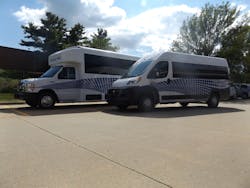HIRTA introduces simplified scheduling
The Heart of Iowa Regional Transit Agency (HIRTA) introduced its new simplified scheduling model March 9.
The simplified scheduling model is designed to combine trips now only transporting one or two riders to create shuttles transporting three or more riders to use HIRTA’s resources more effectively. HIRTA says the goal in making scheduling changes now is to assure transportation is available for all that will need or want rides in the future.
“Simplified scheduling is one part of our response to the rising cost of providing door-to-door affordable public transit at the same availability, [while] state and federal subsidies are capped,” said Julia Castillo, HIRTA Executive Director.
“One change in how Medicaid decided to fund Public Transit has had a devastating financial impact on HIRTA. We went from providing 121,000 rides in FY2017 to 39,000 rides in FY2019, with a loss of revenue from $1.9 million to $586,000,” Castillo continued. “This not only affected those riding under Medicaid, but because we are a shared-ride service the costs per ride were shared too, and now that is no longer the case. Our services won’t continue to exist if they aren’t sustainable. Making the best use of each dollar we receive, whether it is federal funding, voluntary funding from the counties and cities in our region or donations from the public, benefits our riders in the long-run.”
Castillo explains how the cost of a one-way trip for a rider averages between $17.98 and $23.26, depending on the county. And that cost also depends on if trip is shared with at least two other passengers within the same half hour.
“Single-rider, longer distance trips are costing HIRTA much more than we are being compensated, and we are no longer able to supplement the difference,” Castillo said.
HIRTA provides public transportation for residents of Boone, Dallas, Jasper, Madison, Marion, Story and Warren counties.
“As we move forward in implementing our simplified scheduling model, the changes impact less than one percent of riders in the seven counties; however, the financial impact will be much larger. Riders in more populated areas may notice changes in times of service, and riders in counties [with] less-populous communities will see a shift from random days of service to scheduled round-trip service at least one day-per-week, allowing them to schedule medical, shopping and other trips with more certainty,” said Castillo.
Riders likely to be most impacted are those who have used HIRTA to take them on out-of-county trips such as into Polk County. Those one-rider, long-distance trips are no longer being offered.
Castillo says she hopes the simplified scheduling model will allow HIRTA to continue offering a more robust regional service than is being offered by some of Iowa’s other regional public transportation systems.
“At HIRTA, we take pride knowing we do not restrict our ridership to only low-income residents who need handicapped-accessible, door-to-door service,” she said.
Simplified scheduling is not the only step HIRTA is taking to improve its current cash flow and to strengthen its future financial viability. Last fall, HIRTA’s Board of Directors created a foundation, HEART of TRANSIT, to receive grants and donations.
“Without a separate 501c3 non-profit corporation, we weren’t eligible to apply for a lot of grants and while we could accept donations, not many members of the public were aware we could,” said Castillo. “We have received our first grant from United Way of Boone County, in which the money is being used to pay for round-trip rides in Boone County. We have also received specific grants to help pay for bus replacements and a few small individual donations as well. We hope corporate and non-profit donors in other counties will step up to help us continue to deliver services.”
